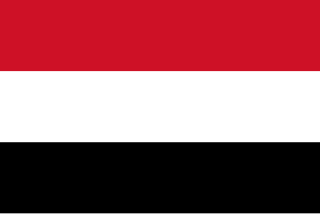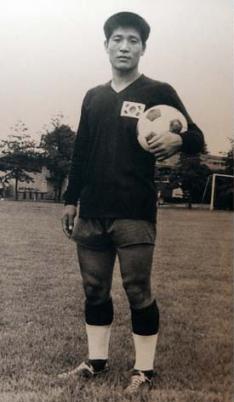The 1956 AFC Asian Cup was the first AFC Asian Cup, held every four years and organised by the Asian Football Confederation (AFC). The final tournament was held in Hong Kong from 1 September to 15 September 1956 as a four-team round-robin competition with no final. It was won by South Korea.
The 1960 AFC Asian Cup was the 2nd edition of the men's AFC Asian Cup, a quadrennial international football tournament organised by the Asian Football Confederation (AFC). The finals were hosted by South Korea from 14 October to 23 October 1960. The final tournament was organised on a round robin basis, and host country South Korea won with a perfect record of three wins.
The 1968 AFC Asian Cup was the 4th edition of the men's AFC Asian Cup, a quadrennial international football tournament organised by the Asian Football Confederation (AFC). The finals were held in Iran between 10 and 19 May 1968, with five teams competing in a round-robin format with no final for what would be the last time. It was also the first tournament with 90-minute games, after 80-minute games in the first three editions.
The 1988 AFC Asian Cup was the 9th edition of the men's AFC Asian Cup, a quadrennial international association football tournament organised by the Asian Football Confederation (AFC). The finals were held in Qatar between 2 December and 18 December 1988. Saudi Arabia defeated South Korea in the final match in Doha.

The Lebanon national football team, controlled by the Lebanese Football Association (LFA), have represented Lebanon in association football since their inception in 1933. The squad is governed by the Asian Football Confederation (AFC) continentally, and FIFA worldwide. While Lebanon have yet to qualify for the FIFA World Cup, they have qualified three times to the AFC Asian Cup: they first participated in 2000, when they hosted the event. Lebanon's main venue is the Camille Chamoun Sports City Stadium in Beirut; however they also play in other locations such as the Saida Municipal Stadium in Sidon.
The South Yemen national football team, recognised as Yemen DPR by FIFA, represented South Yemen in men's international football, playing as one of two Yemeni teams, along with North Yemen.

This page details the match results and statistics of the Afghanistan national football team.
This page details the match results and statistics of the Brunei national football team.
The qualification for the 1960 AFC Asian Cup consisted of 10 teams in three zones with the winners of each zone joining South Korea in the final tournament.
The qualification for the 1956 AFC Asian Cup consisted of 19 teams separated in three zones. The winner of each zone would join hosts Hong Kong in the final tournament. Qualification was done on a two-legged format, home and away games.

This page details the match results and statistics of the Yemen national football team.

The 2023 AFC Asian Cup is the ongoing 18th edition of the AFC Asian Cup, the quadrennial international football tournament organised by the Asian Football Confederation (AFC). It involves 24 national teams after expansion in 2019, with the host Qatar being the defending champions.

Since the AFC Asian Cup was founded in 1956, India has qualified for five Asian Cups, in 1964, 1984, 2011, 2019 and 2023.
Khmer Republic participated in the 1972 edition of the AFC Asian Cup and won 4th place.
Since the AFC Asian Cup was founded in 1956, Qatar has participated in 10 Asian Cups between 1980 and 2019. However, prior to the 2019 edition, Qatar only reached the quarter-finals twice: in 2000 as one of the two best third-place teams when the tournament had only 12 nations competing, and in 2011, when they finished second in Group A behind Uzbekistan.
Group A of the 2023 AFC Asian Cup took place from 12 to 22 January 2024. The group consisted of hosts and defending champions Qatar, China, tournament debutants Tajikistan, and Lebanon. The top two teams, Qatar and Tajikistan, advanced to the round of 16.

Lee Se-yeon is a former South Korean footballer.

This page details the match results and statistics of the South Yemen national football team.

This page details the match results and statistics of the North Yemen national football team.
The United Arab Emirates is one of the more successful teams in the Asian Cup qualifying for ten editions from 1980 to 2019. They have qualified for the semi-finals on four occasions, as well as the final in 1996, however they have never won an Asian Cup.







